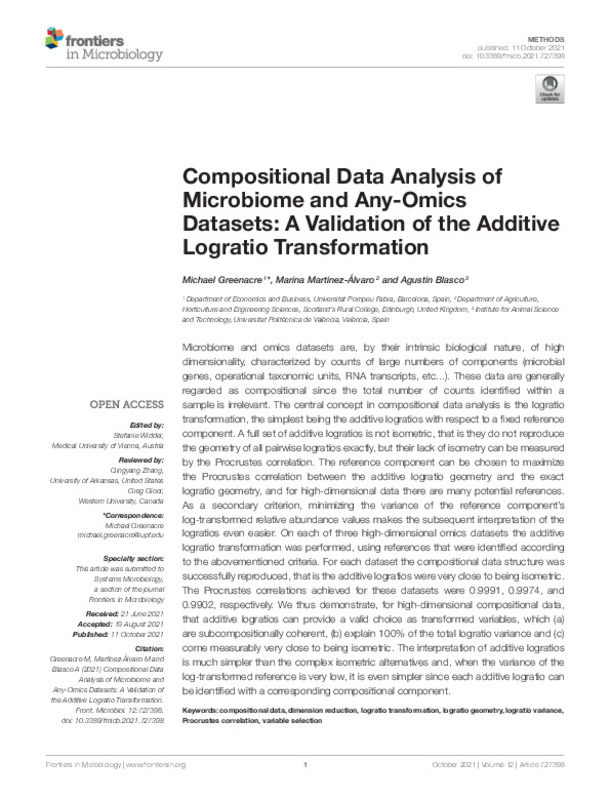JavaScript is disabled for your browser. Some features of this site may not work without it.
Buscar en RiuNet
Listar
Mi cuenta
Estadísticas
Ayuda RiuNet
Admin. UPV
Compositional Data Analysis of Microbiome and Any-Omics Datasets: A Validation of the Additive Logratio Transformation
Mostrar el registro sencillo del ítem
Ficheros en el ítem
| dc.contributor.author | Greenacre, Michael
|
es_ES |
| dc.contributor.author | Martínez-Álvaro, Marina
|
es_ES |
| dc.contributor.author | Blasco Mateu, Agustín
|
es_ES |
| dc.date.accessioned | 2022-06-16T18:05:43Z | |
| dc.date.available | 2022-06-16T18:05:43Z | |
| dc.date.issued | 2021-10-11 | es_ES |
| dc.identifier.issn | 1664-302X | es_ES |
| dc.identifier.uri | http://hdl.handle.net/10251/183405 | |
| dc.description.abstract | [EN] Microbiome and omics datasets are, by their intrinsic biological nature, of high dimensionality, characterized by counts of large numbers of components (microbial genes, operational taxonomic units, RNA transcripts, etc.). These data are generally regarded as compositional since the total number of counts identified within a sample is irrelevant. The central concept in compositional data analysis is the logratio transformation, the simplest being the additive logratios with respect to a fixed reference component. A full set of additive logratios is not isometric, that is they do not reproduce the geometry of all pairwise logratios exactly, but their lack of isometry can be measured by the Procrustes correlation. The reference component can be chosen to maximize the Procrustes correlation between the additive logratio geometry and the exact logratio geometry, and for high-dimensional data there are many potential references. As a secondary criterion, minimizing the variance of the reference component's log-transformed relative abundance values makes the subsequent interpretation of the logratios even easier. On each of three high-dimensional omics datasets the additive logratio transformation was performed, using references that were identified according to the abovementioned criteria. For each dataset the compositional data structure was successfully reproduced, that is the additive logratios were very close to being isometric. The Procrustes correlations achieved for these datasets were 0.9991, 0.9974, and 0.9902, respectively. We thus demonstrate, for high-dimensional compositional data, that additive logratios can provide a valid choice as transformed variables, which (a) are subcompositionally coherent, (b) explain 100% of the total logratio variance and (c) come measurably very close to being isometric. The interpretation of additive logratios is much simpler than the complex isometric alternatives and, when the variance of the log-transformed reference is very low, it is even simpler since each additive logratio can be identified with a corresponding compositional component. | es_ES |
| dc.description.sponsorship | Support is acknowledged from the Spanish National Plan of Scientific Research, Project PID2020-115558GB-C21. | es_ES |
| dc.language | Inglés | es_ES |
| dc.publisher | Frontiers Media SA | es_ES |
| dc.relation.ispartof | Frontiers in Microbiology | es_ES |
| dc.rights | Reconocimiento (by) | es_ES |
| dc.subject | Compositional data | es_ES |
| dc.subject | Dimension reduction | es_ES |
| dc.subject | Logratio transformation | es_ES |
| dc.subject | Logratio geometry | es_ES |
| dc.subject | Logratio variance | es_ES |
| dc.subject | Procrustes correlation | es_ES |
| dc.subject | Variable selection | es_ES |
| dc.subject.classification | PRODUCCION ANIMAL | es_ES |
| dc.title | Compositional Data Analysis of Microbiome and Any-Omics Datasets: A Validation of the Additive Logratio Transformation | es_ES |
| dc.type | Artículo | es_ES |
| dc.identifier.doi | 10.3389/fmicb.2021.727398 | es_ES |
| dc.relation.projectID | info:eu-repo/grantAgreement/AEI/Plan Estatal de Investigación Científica y Técnica y de Innovación 2017-2020/PID2020-115558GB-C21/ES/CREACION DE DOS LINEAS SELECCIONADAS POR EFICIENCIA ALIMENTARIA Y POR RESILIENCIA/ | es_ES |
| dc.relation.projectID | info:eu-repo/grantAgreement/GENERALITAT VALENCIANA//AICO%2F2020%2F349//AUMENTO DE LA LONGEVIDAD Y LA RESILIENCIA EN LINEAS MATERNAS COMERCIALES DE CONEJO / | es_ES |
| dc.rights.accessRights | Abierto | es_ES |
| dc.contributor.affiliation | Universitat Politècnica de València. Departamento de Ciencia Animal - Departament de Ciència Animal | es_ES |
| dc.description.bibliographicCitation | Greenacre, M.; Martínez-Álvaro, M.; Blasco Mateu, A. (2021). Compositional Data Analysis of Microbiome and Any-Omics Datasets: A Validation of the Additive Logratio Transformation. Frontiers in Microbiology. 12:1-11. https://doi.org/10.3389/fmicb.2021.727398 | es_ES |
| dc.description.accrualMethod | S | es_ES |
| dc.relation.publisherversion | https://doi.org/10.3389/fmicb.2021.727398 | es_ES |
| dc.description.upvformatpinicio | 1 | es_ES |
| dc.description.upvformatpfin | 11 | es_ES |
| dc.type.version | info:eu-repo/semantics/publishedVersion | es_ES |
| dc.description.volume | 12 | es_ES |
| dc.identifier.pmid | 34737726 | es_ES |
| dc.identifier.pmcid | PMC8561721 | es_ES |
| dc.relation.pasarela | S\460943 | es_ES |
| dc.contributor.funder | GENERALITAT VALENCIANA | es_ES |
| dc.contributor.funder | AGENCIA ESTATAL DE INVESTIGACION | es_ES |
| upv.costeAPC | 3700 | es_ES |








